#nezha chinese mythology
Explore tagged Tumblr posts
Note
i know you said you haven’t figured out it out yet but i’d like to hear any thoughts or random ideas you might have abt nezha & nico, either in general or in the time travel verse 👩🏫
Wow I didn't expect someone would actually be interested in this... Well, all the more motivation to be enthusiastic, then. xD
You're right that I've yet to figure out their connection, however, I can tell a little about that that drew me to the idea of them in the same picture.
The first would probably be their characterization.
Both are painted in black and white, of kindness and the flaws within. Afaik, the whole thing about Nezha is that he's a naughty, carefree, uncontrollable menace yet also kind in his own ways. He did so many wrongs and he tried to do just as many rights to make up for it. It's similar to Nico, in the way that they are kind at heart, yet can appear evil in others' eyes for some reason. And yes, they both have committed conventional horrible. Hell, Nezha peeled off Ao Bing's spine or st. Would you look at that, Bryce?
Grudge-holding. Now, I'm not saying I fancy what Rick did to Nico's fatal flaw, but talking in canon here, Nico held his sister's death against Percy (and himself) for quite a while; whereas Nezha, having died and was reborn again, literally came fighting his father because the man ruined his temple, where his soul resided. Like. If that isn't one hell of a grudge then I don't know what is.
Their spirits, their willpower, the prowess they possess despite their young ages. They are both so fierce, unstoppable, and resilient. Nezha is portrayed as a literal child in Chinese mythology, but his story is one hell of a ride (ya know, with all the slaying dragons, carving up his own flesh...). Idk about you but it gives me an impression of how intense Nezha might be, which is quite a reflection of Nico's story and characterization. Because Nico is... extreme, too, and you can't possibly tell me Nico's life story, with all that Tartarus and torture in the jar, isn't a grand tale in its own way. Alas, against all odds, they both emerge victorious. I love them.
They're both freaking powerful too, btw. But again, I guess every mythological figure is powerful in its own way.
Idk about you but I think Nico and Nezha should be allowed to sit down together and trade gory, creepy, bloody stories about themselves just to scare everyone else.
2. Their backgrounds, their stories.
They both have daddy issues omfg. Nezha literally fought his father, who ruined Nezha's temple, to the point of interference from other deities. And while I love Nico and Hades's love with everything in me, they did have a strained relationship throughout PJO. Hades told Nico he would prefer Bianca over him, and later nearly fired a ball at him. If that isn't parallel I don't know what is.
Their mothers love them so much I'm crying. Nezha's mother, Lady Yin, carried him in her womb for years and built him a temple when he asked her in a dream. And I suppose we don't need to talk about Maria anymore.
They are both, technically, 'prince's LMAO. Nezha is known as the Third Crowned Prince (or whatever that is bc Chinese is so hard to translate into English omg) and Nico is well, Nico. Their fathers are both technically kings, as well. Hades because obviously, Li Jing is known as one of the Heavenly Kings. And if you really look into it, Nezha is a commander of Heaven's army, directly under his father, whilst Nico is the Ambassador of Hades. Wow.
They are viewed as awful in people's eyes but still took efforts to help. I'm gonna admit my viewpoint might be altered by the Nezha (2019) movie. Nonetheless, I find it quite interesting that Nezha and Nico, though being scorned and ostracized by their kind, ended up being their saviors. Nezha killed himself when the Dragon King threatened to flood his hometown, and Nico went such lengths to aid the Seven with their world-saving quests. This is also proof of their kindness, which I adore so much, btw.
Feud with the sea. Well maybe not feud in Percy and Nico's case. A sensitive topic. History, maybe? Lol. Anyway, the fact remains that both Nico and Nezha share an unpleasant history with a son of the seas. If you take Nezha (2019) into consideration though, they both make peace with said animosity too! xD
They both befriend their old enemies. I'm talking about Wukong and Bob. It's fascinating, in a way lol.
These are everything I can come up with so far... Huh. I didn't expect them to share so similarities... I'm serious about Nezha and Nico having a bonding session now. These two are deemed to be besties.
It doesn't need to be in the Time Travel AU. Nico crash-landed in China before, didn't he? Maybe, Idk, Nezha was sent to investigate, and they ended up friends because Nico is as social as a capybara and Nezha has all the purity and generosity of a carefree child who fears nothing.
...I'm so deep in this omg...
Anw, if you want to share your Nico and Nezha content, I'm all ears!! xD
#nico di angelo#pjo#hoo#toa#yone rambling#percy jackson and the olympians#heroes of olympus#trials of apollo#nezha#nezha chinese mythology#time travel au#time travel#nico and nezha
19 notes
·
View notes
Text
Erlang Shen—A Playful Free Spirit Pt. 2
If you think Erlang Shen is just a stoic, no-nonsense warrior god, you're definitely missing out. One of the most fascinating quirks about him in Chinese mythology is his adaptability and love for transformation, especially into a woman, to mess with people. He fully commits to those roles, playing with assumptions about gender and appearance, letting others trip over their own indoctrinated misconceptions.

The most well-known example is from The Investiture of the Gods. Erlang is tasked with protecting a prince from an assassination. Instead of just standing guard, he turns a melon into the prince and transforms himself into a beautiful concubine. The assassin, thinking he's succeeded after beheading the “prince,” quickly turns his attention to the “concubine” who's begging for mercy. Caught up in lust, the assassin lets his guard down, and that's when Erlang strikes, back into his true form with the assassin dangling under his arm, still dazed and confused.
This is by no means the only account of Erlang's gender-bending transformations. In JTTW, he and Sun Wukong engage in an iconic shape-shifting duel, each transformation designed to one-up the other. When Wukong turns into a creature, Erlang counters by transforming into its natural predator. In the folk version (similar style to the headless monk song in Black Myth: Wukong) of Havoc in Heaven, Erlang ups the ante by transforming into a young widow and even delivers a four-minute soliloquy mourning her lost husband, unfortunate miscarriage, and harsh in-laws. Wukong is unfazed and transforms into the flirtatious brother-in-law, teasing the young widow and grabbing her foot (a scandalous act for that time). Startled, Erlang drops the act and chides Wukong for his lewdness. It seems less like a serious battle but more like a courting game playful test of boundaries, each trying to throw the other off balance.
Erlang also plays with gender expectations and power dynamics outside of battles. In a 12th-century collection of strange tales (《夷坚志》), a strong laborer named Cai Qi stumbles across a handsome young man by a bridge late at night. A bit tipsy and opportunistic, Cai Qi grips the young man, intending to take advantage of him. The young man is actually Erlang Shen on a casual trip in the mortal world. Instead of confronting Cai Qi directly, which would’ve been very easy for a god, Erlang plays along, pretending to be overpowered and offering a silver wine vessel as a bribe to plea himself out of the harassment. Cai Qi, thrilled with the windfall, takes the silver home, only to discover the next day that the public storehouse is missing silver. He realizes too late that Erlang has his presumptuousness and greed lead him into trouble.

This playful trickery makes its way into modern retellings as well. In the 2003 animated series The Legend of Nezha, Erlang Shen pulls another gender-bending transformation during a playful match with Nezha. After stealing Nezha’s weapon, the Red Armillary Sash (混天绫), Erlang transforms into a woman crying by the river, conspicuously draped in the sash and calling for help from Nezha. Seeing through Erlang's shenanigan, Nezha demands his weapon back. Erlang feigns innocence and tells Nezha to go take her clothes himself, taunting, “What kind of hero robs a woman’s clothes in broad daylight?” Flustered, Nezha concedes the win and asks Erlang to transform into anything else. Erlang laughs, tosses back the sash, and calls for another rematch.
While quite a few gods and yaoguais in Chinese mythology use transformation as a disguise, Erlang Shen takes it further by leaning into the roles spontaneously to confuse, distract, and tease, playing with both gender and power dynamics. His transformations aren't just about hiding or escaping—they're about flipping the script and catching others off guard. As the god who tames the water, true to form, Erlang is adaptive, pragmatic, and fluid.
“Naturally fond of roaming free, with transformations that follow no fixed pattern.” —Indeed.
#erlang shen#yang jian#chinese mythology#journey to the west#black myth wukong#sun wukong#investiture of the gods#nezha
212 notes
·
View notes
Text
in chinese mythology the fèng huáng (鳳凰) and the lóng (龍) which are the closest thing to what we call a phoenix and a dragon are the most ancient and common representation of yin and yang. the phoenix embodies the feminine, transformation, renewal and justice. on the other hand, the dragon represents the masculine with its strength and power, and is often associated with the imperial authority. according to some myths, the phoenix and the dragon are celestial beings that fall deeply in love and act as guardians of cosmic balance, ensuring the harmony and balance of the material and spiritual world
147 notes
·
View notes
Text
A side-by-side comparison of Nezha's backstory in JTTW and FSYY
(Sth I've been working on for a while, as quick reference material for Nezha's story in the two novels specifically that doesn't go into the broader mythos.)
JTTW's Nezha:
-Born with the characters "Ne/Na" on one hand, and "Zha" on the other
-Has 2 older brothers and 1 younger sister: Jinzha, who worked as a guardian deity and attendant of the Buddha, Mucha, who was the disciple of Guanyin, and Li Zhenying, who's said to be 7 years old in JTTW (Chapter 83).
-There's also Diyong/Lady Earth Flow, the adopted mice sister that had eaten the Buddha's candle, was captured by Li Jing and Nezha, and spared on the Buddha's order.
-She shows up in Chapter 80, as a demoness who kidnapped Tripitaka for the purpose of marriage, and is subsequently recaptured to face celestial judgement.
-Three days after his birth, Nezha went off into an unknown ocean, stepped on a crystal palace and toppled it, and caught a flood dragon to use its tendon as a belt
-After that, Li Jing tried to kill him for being a menace, and Nezha did the "Return his flesh and bones to his parents" thing in anger
-His soul then drifted off to the Buddha's place, who performed the Lotus Resurrection Thing by reciting a mantra
-He then subdued 96 caves of demons, and went after Li Jing to take revenge for the "forced suicide" thing
-Li Jing pleaded to the Buddha for help, who gave him a pagoda with Buddhas sculptured on every level, and told Nezha to call the Buddha (on the pagoda) as his father from now on.
-The weapons he used in his Three-headed Six-Armed Form: The Demon-slaying Sword + Demon-cutting Blade, Demon-binding Rope + Demon-subduing Vajra, Embroidered Ball, Fire Wheel (held in his hand)
FSYY's Nezha:
-Is the reincarnation of Taiyi's oldest disciple, Spirit Pearl/Lingzhu Zi
-Is destined to be the Vanguard of the Zhou army in the upcoming War of the Investiture
-Has 2 brothers: Jinzha, disciple of Wenshu Guangfa Tianzun, and Muzha, disciple of Sage Puxian. (FSYY's quirk of making popular Buddhist deities into Daoist sages in a trenchcoat is at play again.)
-Mother was pregnant with him for three years, gave birth to a ball of flesh
-Jumps out of the ball of flesh when Li Jing cuts it open, wearing his Qiankun Ring as a bracelet, Huntian Sash wrapped around his stomach
-Was immediately taken by Taiyi as a disciple the next day, who told Li Jing that, born in the hour of Chou, Nezha is destined to break 1700 prohibitions against killing
-A 6 ft tall 7-years old (FSYY's sense of scale is really weird, like all old novels)
-Asked to go out and play in the river during summertime, unknowingly created a shockwave in the water with his sash that shook Ao Guang's palace in the East Sea.
-Ao Guang sent a Yaksha to check it out. Nezha sassed the Yaksha, who attacked him in a fury and got insta-killed.
-Ao Guang's soldiers reported the Yaksha's death. Ao Bing overheard the whole thing, asked to go deal with this random brat, and was granted permission by his father.
-Ao Bing rode out of the waves on his steed, and went "Who are you, sassy lost child, and did you just kill my Yaksha?!" And Nezha was like "Yeah, so what? Talk shit, get hit."
-Ao Bing charged Nezha with his weapon in a fury, got dragged down his steed by the sash, and was promptly bonked on the head by the Qiankun Ring, which reverted him to his dragon form.
-Nezha then pulled out his tendons to make a belt for Li Jing's armor and returned to Chentang Pass. Furious, Ao Guang hurried his way to Li Jing's mansion and accused him for the whole multiple homicide thing.
-Li Jing's first reaction was "My kid's only 7 and never goes out of the door, he can't possibly kill yours!" Then, when he indeed asked Nezha, Nezha flat-out admits it and went out to meet Ao Guang like "Yeah, sorry, doesn't know that's your kid. Anyways, here's his tendons, undamaged and untouched."
-Ao Guang, unsurprisingly, did not take it well and stormed off to press charges to the JE. Faced with his angry crying parents, Nezha also knew he had fucked up, and went to his master Taiyi for help.
-Taiyi's advice? Go ambush the dragon king on his way to complain to the JE and beat him up, mobster-style. Which Nezha promptly did, forcing Ao Guang to turn into a little snake and stay in his sleeves, to be carried back to Chentang Pass.
-The beatdown does not convince Ao Guang not to press charges. In fact, he said he'd get the other dragon kings of the Four Seas to press charges together. Li Jing raged at Nezha again, who assured him that it was alright, like, his master said he was destined to assist some Sage King and stuff.
-He then wandered into the back garden, picked up the Qiankun Bow and Sky-shaking Arrows of the Yellow Emperor that were, uh, just kept there in the family attic, and decided to do some archery practice.
-Sadly, he didn't know how far that arrow would go. It flew all the way to the White Bone Cave, abode of Lady Shiji the Rock Demoness, and went straight through the throat of one of her two disciples, the Verdant Cloud Boy.
-Since Li Jing also carved his name onto the arrow (…), Lady Shiji headed immediately to his place and whisked him away with her treasure, the Eight Trigrams Hankerchief.
-At her place, Li Jing pleaded that he really didn't do it, since the Qiankun Bow was a mystical ancient weapon no one could use in a long, long time, and Shiji released him back to Chentang Pass to find the true culprit. At which point he put two and two together, found out it was Nezha again, and told him to go answer to Shiji together with him.
-Nezha, who did not think this was his fault, smacked Shiji's other disciple, the Colored Cloud Boy on the head with his Qiankun Ring, when he came out of the cave on his master's orders. Shiji was even less happy about that, took his weapons away with a single swipe of her sleeves, then chased him all the way to Taiyi's place.
-At which point Taiyi was like "Well, if you want Nezha to pay for his crimes, how about we go to the Jade Emptiness Palace together and let my master (Yuanshi Tianzun) sort it out?" Shiji refused, stating that he was just using his master's authority to lord over her and unfairly protect his disciple.
-Taiyi then revealed the Chan-Jie division that would later become a huge thing in the War of Investiture, and basically went "Sorry that your student died in Nezha's archery accident, Lady Shiji, but it is literally Fated to Happen, which means you totally shouldn't be mad at me or him."
-Shiji did not buy that explanation at all, and they fought. Taiyi blocked her hankerchief when she tried to use it, then threw the Nine Fire Dragon Bell Cover over her head, burning her to death and reverting her to her true form——a rock.
-Taiyi then informed Nezha that with JE's permission, Ao Guang had gathered the other dragon kings to go after Nezha's parents. Nezha begged him to save them, and his advice was...well, "kill yourself and the dragon kings will let them go". Literally.
-So Nezha did, which was very graphically described in the novel, after which his soul drifted off to Taiyi's place.
-Taiyi told him to go to his mother and tell her to build a temple for him at Mt. Cuiping. He did, and Lady Yin woke up from her dream crying.
-Upon learning the reason why, Li Jing yelled at her for crying after Nezha had brought all these troubles upon their family. Nezha's soul then haunted her in her dreams for a week or so, until she finally relented and built him a temple in secret.
-Half a year later, Li Jing found out about the temple while Nezha's soul was out and away for some unknown reasons. In a fit of rage, he smashed Nezha's statue and burned the temple down (I talk about how this resembles the destruction of 淫祠, illicit cults in IRL history here).
-Nezha returned to his temple only to find it in ruins, at which point he went back to Taiyi, who did the Lotus Resurrection thing and gave him back his weapons, together with a new spear, the Wind-Fire Wheels and a golden brick.
-Nezha immediately rushed back to Chentang Pass to take revenge, stating that after the whole "returning his flesh and blood" thing, they were basically unrelated and didn't owe each other anything, so he was perfectly justified to go after Li Jing for the destruction of his temple.
-They fought. Li Jing, quickly exhausted, turned tail and fled using the Daoist arts of Earth Travel, at which point he ran into Muzha. While they were talking, Nezha caught up with them.
-Muzha was like "How dare you!" and Nezha replied with "Who the hell are you?" Only after Muzha said his name out loud did he recognize his brother and recount the whole story.
-Muzha retorted that "Parents can do no wrong". Nezha pointed out that after his suicide, they were no longer father and son, and told him to stand aside.
-Muzha whipped out his sword to fight him. Concerned that Li Jing might get away in the meantime, Nezha threw his golden brick at Muzha, hitting him in the back and knocking him down.
-The chase continued. Li Jing, knowing that he couldn't run away forever, was ready to commit suicide instead of facing the disgrace of being struck down by his son.
-However, Jinzha's master, Wenshu, suddenly showed up to rescue him. Nezha demanded that Wenshu release Li Jing from his abode, and if he didn't, he'd poke three holes in Wenshu instead.
"And who are you, to make such claims?"
"I am Nezha, disciple of Master Taiyi!"
"Never heard of you. You can throw a tantrum elsewhere, but not here, and if you keep this up, you are in for a spanking."
-Nezha attacked him. In return, Wenshu unleashed his treasure, the Flying Dragon Pillar, tying Nezha onto it. He then summoned Jinzha, handed him a walking stick, and told Jinzha to give him a good whipping.
-Then Taiyi showed up to rescue him, telling Nezha to bow to Wenshu, his Daoist uncle (Context: Taiyi and Wenshu are both among the 12 Immortals of the Chan Sect), and scolded Li Jing a bit for the temple-burning thing.
-Then he told the two to get along and go their separate ways. Nezha was delighted, seeing it as basically a free pass to resume his revenge the moment he was out of his master's sight, and indeed, he did.
-Then Sage Randeng (also of the Chan Sect) showed up, gave Li Jing a buff, and told him to fight Nezha again. Nezha, having witnessed the whole thing and reached an impasse in the fight, attacked Randeng in an attempt to disable the buff.
-Randeng was not happy about this "unprovoked" attack on an innocent bystander, so he dropped a pagoda out of his sleeves and onto Nezha, trapping him inside.
-On Randeng's command, flames ignited inside the pagoda. At last, Nezha pleaded for the sage to release him, under the condition that he'd call Li Jing father (grrrr grrrr) again.
-He was planning to pull a second "resume patricide arc" the moment Randeng left, until the sage gave the pagoda to Li Jing and told them to go back to Chentang Pass and Taiyi's place respectively, to wait until the War of Investiture formally began.
-And they did: Nezha was sent to rescue Huang Feihu during his escape from the Five Passes in Chapter 34, while Li Jing only showed up much later in Chapter 64, to kill a fleeing Luo Xuan after he got all of his fire-based treasures neutralized and taken away by Princess Longji.
-I will not do a full campaign-by-campaign summary of Nezha's performance in the War of Investiture proper, for this post is already long enough.
-The broadest overview: together with his senior Daoist brother Yang Jian, Nezha was one of the biggest powerhouses on the Chan/Zhou side.
-His total kill count in the novel (only counting the named/deified ones) is 15, which is actually more than Yang Jian's (12-13).
-Much like Yang Jian, he was often the one who survived lethal attacks and AOE plague spells while the others were taken out. His lotus body also made him impervious to spells and treasures that work directly on the soul, usually by pulling it out of the body.
-After suffering an injury from the Blood-melting Knife of Yu Hua/his master Yu Yuan, Nezha was given his final power-up at Taiyi's place via three cups of wine and three "fire jujubes", enabling him to transform into his Three-headed, Eight-armed Form.
-At the end of the novel, Nezha, together with Li Jing, Jinzha, Muzha, Yang Jian, Weihu and Lei Zhenzi, became "Sages in Flesh"——which I understood as "a better sort of gods/immortals that don't receive their godhood via death and deification".
-The 6+ weapons he has: Qiankun Ring, Huntian Sash, Fire-tipped Spear, Golden Brick, Wind-Fire Wheel (in its most popular "hot wheels" depiction), Yin-Yang Swords, Nine Fire Dragon Bell Cover
#chinese mythology#chinese literature#journey to the west#investiture of the gods#fengshen yanyi#xiyouji#Nezha
179 notes
·
View notes
Text

Don't embarrass him in front of his master (◠‿◕)
#jttw sun wukong#jttw#lego monkie kid#monkei kid#artwork#sketch#digital art#digital illustration#erlang shen#lmk nezha#nezha#chinese mythology
105 notes
·
View notes
Text
“A Different Ending” 🐺x🐵
read Left ➡️ Right



~~~



~~~And then Jiankong marries at Mountain of Flowers and Fruit, the End~~~! 🩷🫶
BONUS:

Iz a prank (does this count as OOC?)
This is my first comic in a while, I hope you like it🩷
#jiankong#kongjian#sun wukong#erlang shen#jttw sun wukong#jttw erlang#jttw#journey to the west#xiyouji#artist#artist on tumblr#artists on tumblr#jade emperor#nezha#just a little bit#i hate them#but i love them#comic#comic art#please be nice im tired#chinese mythology
117 notes
·
View notes
Text

opera, Wukong and Nezha
#chinese opera#chinese mythology#journey to the west#art#illustration#peking opera#sun wukong#nezha#孙悟空#哪吒#西游记#京剧
139 notes
·
View notes
Text
I love the idea of a Nezha retelling instead of being told like a myth it’s told like fiction, putting more focus on how it would actually feel to be in these situations.
I want to see Li Jing come to terms with the fact that his youngest son, his baby boy, ripped out the spine of a dragon prince with his bare hands. I want to see the horror on his face as he stands face to face with a dragon king and realizes that Nezha has doomed them all.
I want to see Nezha throw a tantrum (like any child his age would) screaming that it wasn’t fair, that he shouldn’t be punished for defending himself.
I want to see Lady Yin make a temple for her baby and I want to see her cry as her husband burns it to the ground
I want to see Nezha as both a hero and a monster, reconstructed as a zombie made of lotus and spite, riding on wheels of fire towards the father who now refused to call him son, who let him sacrifice himself when he was far to young to understand the weight of his actions. Who shunned him when all he needed was a father to tell him what to do and how to fix it.
I want to see Nezha’s story as not a tale of Confucianism or heroics, but as a cruel reminder of what happens when we give children the power and responsibilities of adults.
Or maybe I should write it myself
#nezha#li nezha#nezha conquers the dragon king#nezha lmk#chinese mythology#chinese folklore#mythology#mythology and folklore#myth#folklore#mythology retelling#nezha 2019#nezha reborn#fsyy#investiture of the gods#fengshen yanyi
65 notes
·
View notes
Photo


prince nezha
>> ruemxu
525 notes
·
View notes
Text










I made more memes. :)
#chinese mythology#chinese folklore#nezha#muzha#jinzha#sun wukong#yuding zhenren#master subodhi#liu'er mihou#chenxiang#chikao mahou#tongbi yuanhou#memes
79 notes
·
View notes
Text
according to fsyy, li jing’s pagoda was originally given to him to use in self-defense from a patricidal nezha, and chinese netizens like to joke that he keeps it around because he knows it’ll be over for him once nezha notices it’s missing 💀
in the lady earth flow arc of jttw, when nezha uses his sword to stop li jing from attacking sun wukong, li jing PALES in fear because he thought nezha was going to betray him and he didn’t have his pagoda around to protect himself
of course nezha isn’t trying to kill him; he was stopping li jing from killing swk (because swk was gonna take him to court LMAO). and today i saw some c-netizen comments on XHS and i wanna summarize them because oh man 😭 :
nezha has moved on from their feud, but li jing will be haunted forever. the pagoda isn’t just for his protection; it’s to remind him of the consequences of his actions because he can never put it down, not unless he wants to risk getting attacked again. he’ll be forced to carry that pagoda for the rest of his life
#the way he gets so scared in jttw when nezha stopped his sword cracks me up every time 💀��#as someone who laughed the entire time i read nezha’s backstory in fsyy because it reminded me too much of my own father#this interpretation (the last paragraph of my post) makes me very happy :)#li jing isnt cunning or malicious but he is VERY impulsive and trigger-happy#and this is his consequence 👍 he never gets inner peace LMAO /hj#jttw#journey to the west#fsyy#fengshen yanyi#investiture of the gods#nezha#chinese mythology#li jing
30 notes
·
View notes
Note
I’ve been curious as to why Erlang Shen, who was once depicted as a heroic lord with strong ties to the mortal realm, was turned into this cold-hearted "hound of heaven" figure. I get that his influence had waned, and you've said that it was an unconscious effort to revive key themes from his lore. That might make sense during a decline in his worship. But why did they have to lean into a more negative interpretation of his character? Sorry for the example, but it reminds me of how characters who were originally portrayed as good and fair sometimes get flipped into their opposite, and that darker version sticks. It’s kind of the reverse of the trope where villains become heroes. Take Sun Wukong, for example: he originally wasn’t some oppressed freedom fighter for the yaoguais (like he only cares about his children, which isn't bad but yeah). He was a warlord whose pride got wounded, and he threw a massive tantrum because he wasn’t getting the position he thought he deserved. Black Myth: Wukong shows him as a misunderstood revolutionary. But with Erlang Shen, it's the opposite—he started as a popular hero and deity, and yet he’s been reduced to a villainous enforcer. From what I’ve heard about his original stories and your and many others posts, he was a good person and a hero, not the oppressive figure he's been turned into over the years. It’s strange to see him constantly depicted in such a terrible light when his lore is so much more complex and positive.
Yeah, it can get frustrating, but I’d say the tide has turned since the early 2000s. Erlang is almost always portrayed as charismatic and dependable in Investiture of the Gods adaptations. In JTTW-inspired works, he's meant to be a positive figure as well, though some adaptations that focus solely on the main hero can end up oversimplifying or even discrediting complex supporting characters. To me, it always feels like such a waste of the rich source material.
In the past two decades though, the trends has leaned towards depicting Erlang Shen as a misunderstood hero. When the Black Myth: Wukong intro first came out, many people were disappointed, though not entirely surprised, to see Erlang cast as the antagonist again. So when it was later revealed he was more complex than he first appeared and had been our ally all along, the Chinese audience were both relieved and greatly satisfied.
I do think part of the reason Erlang wasn’t more fully developed in modern media previously might be precisely because he’s a righteous god—a character archetype that doesn’t always translate well in eras that celebrate antiheroes, individualism, and self-made rebels. Figures like Wukong and Nezha, who actively defy traditional values, fit the idea of a hero as someone who challenges the status quo. Meanwhile, the classic hero archetype can get pedantic and lose its emotional impact. Erlang Shen is a classic hero but is also more than that: his nuances bridge the old and the new and can resonate well with the audience today. Yet, his complexity isn't always easy to convey in the short-form messaging more typical of today's media.
In the end, all canonized characters need to adapt to remain relevant, and new audiences need a bit of patience and curiosity to get to know them. I think it just took Erlang some time to find his place in our era, but for a folk god with millennia of history, that's not too bad at all 😉
#erlang shen#yang jian#chinese mythology#black myth wukong#journey to the west#investiture of the gods#sun wukong#nezha
47 notes
·
View notes
Text
LMK VS Legend: Li Jing, Nezha, & Family
Finally thought I would do this with the debut of Li Jing and Nezha's more frequent appearances. These two needed their page.Li JIng I could not find much so I made it a family page.
Legend:
Li Jing is renowned throughout the Shang dynasty as a high-ranking commander officer of the Old Pond Pass. Throughout his past, Li Jing studied under Mount Kunlun and soon became a master of exceedingly fast underground travel. His wife is Lady Yin, and he has three sons.

His Wife:
Lady Yin: She played a prominent role in the nurture of Nezha. According to legend, she is said to be the incarnation of the second daughter of the Jade Emperor. Her full name is Yin Wuming in the Fengshen Yanyi, and it is called Lady Yin in the Ming dynasty religious book The Collection of Gods in Three Religions
His Sons:
Jinzha: A disciple of the superiorman Wenshu Guangfa Tianzun. Originally, Jinzha was one of the Five Great Wisdom Kings in Tibetan Buddhism, also known as Kuṇḍali or sometimes as the Ganlu Mingwang (甘露王), who was responsible for longevity, healing, purification, and exorcism. However, due to potential influences from folk literature, the name "軍吒" (Junzha or Junzhalili) was changed to "金吒" (Jinzha) to align with the character "木吒" (Muzha). In folk temple festivals, Jinzha is often referred to as the "Great Crown Prince of Tuotuo Tianwang" and is worshipped in temples along the southern coastal regions.

Muzha: He is a disciple of the Bodhisattvas Samantabhadra and Guanyin. Muzha is worshipped as a deity in Chinese folk religion, known as Muzha Tianzun.

Nezha: He is a protection deity in Chinese Buddhism, Confucianism, Taoism, and Chinese folk religion. His official Taoist name is "Marshal of the Central Altar" (中壇元帥). He was then given the title "Third Lotus Prince" (蓮花三太子) after he became a deity.

Story:
Nezha's mother, Lady Yin, gave birth to a ball of flesh after gestating for three years and six months. Li Jing thought his wife had given birth to a demon and attacked the ball with his sword.
Li Jing and Nezha's relationship began as rocky because Nezha is disobedient and short-tempered. Nezha would cause untold chaos and trouble in the future, such as that with the Eastern Sea Dragon King Ao Guang. Nezha kills the Dragon King's son and gains his wrath.
When Nezha was seven years old, he became sick of the summer heat, and decided to take a bath in the nearby Jiuwan Stream, using his Red Armillary Sash (混天绫) as a towel. It sent tremors through the water, shaking the East Sea Dragon King, Ao Guang's undersea palace.

A Yaksha, Li Gen, was sent to investigate the disturbance. Nezha insulted him, causing him to attack Nezha and being killed by his Universal Ring (乾坤圈). The Dragon King's soldiers reported Li Gen's death to him, and Ao Bing, his third son, volunteered to deal with Nezha. Nezha slew him in combat, then pulled out his tendons to make a belt for Li Jing.
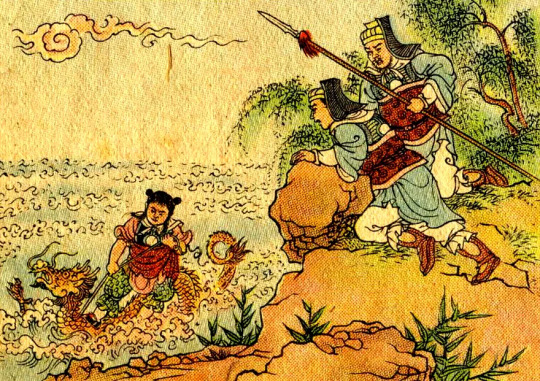
When Ao Guang learned of his son's death, he transformed into a human scholar and went to Li Jing's residence to protest. Nezha admitted to killing Ao Bing and returned his tendons to Ao Guang, who told Li Jing he would file a complaint to the Jade Emperor.

Facing his parents' wrath, Nezha went to Taiyi Zhenren for help. He drew an invisibility talisman on Nezha and told him to ambush Ao Guang under the Heavenly Gate.

Nezha beat the Dragon King forcing him to turn into a small snake and returned to Chentang Pass with him.

Upon arrival, Ao Guang transformed back into his human form, proclaiming he would gather the other Dragon Kings of the Four Seas and report the Li family to the Jade Emperor.

Lady Yin then sent Nezha into the back garden. He climbed up the barbican, where he came across the Universal Bow (乾坤弓) and Sky Shaking Arrows (震天箭) of the Yellow Emperor, sitting on a weapon rack. Eager for some archery practice, he lifted the bow and shot an arrow into the air, which flew all the way to White Bone Cave and killed the Verdant Cloud Boy (碧云童子), an acolyte of Lady Shiji (石矶娘娘). Because Li Jing had carved his name onto the arrow, Shiji went to Chentang Pass, seized him, and took him back to her abode.
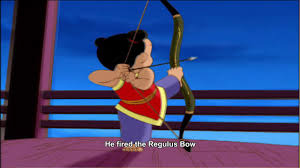
Li Jing explained to her that no one had been strong enough to lift the Yellow Emperor's bow since it was placed in Chentang Pass, and she allowed him to return to the pass to find the real culprit. When he learned that Nezha was responsible, he took his son back to the White Bone Cave to answer to Shiji. Nezha attacked her other acolyte and tried to fight Shiji, but had both of his weapons taken away, forcing him to flee to his master's abode. Taiyi Zhenren killed Shiji with the flames of the Nine Dragon Divine Bell Cover (九龙神火罩), reducing her to her true form: a rock.
Nezha was then informed that the Dragon Kings of the Four Seas, with the permission of the Jade Emperor, had come for his parents. Due to Nezha causing trouble in the Eastern Sea Dragon's Kingdom, Li Jing was required to give his life to Ao Guang if he did not sacrifice Nezha. But Nezha sacrificed himself, handing over his flesh to his parents.

Nezha then appeared in his mother's dream. In the dream, he asked her to build a temple for him, so that his soul would have a place to rest. His mother then secretly built a temple for Nezha, and this temple later flourished. This temple became well-known and grew vastly because Nezha granted miracle cures to the sick and the crippled.

Following the bitter luck attained with his third son, Li Jing burned the sacrificial temple, Lady Yin would be scolded by Li Jing profusely following this point.

However, due to the temple burning, this made Nezha wish to kill his father.
After Nezha was reincarnated, his body remade by his master Taiyi Zhenren, his father saw him and said, "You vermin! When you were my child, you caused untold calamities. Why do you reincarnate and disturb the peace?" Thus, a major conflict between Li Jing and Nezha began to unfold.
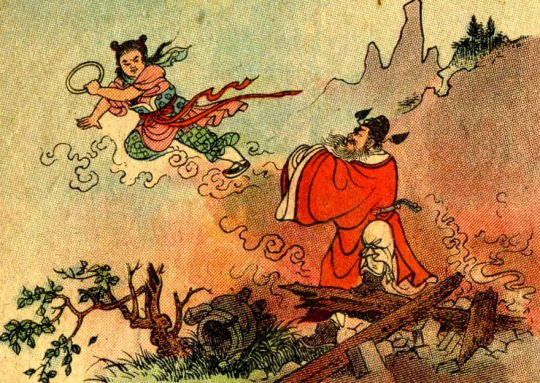
After battling Nezha, Li Jing soon realized that his mortal body did not match 1 to 100 compared to that of Nezha's. Thus, he ran as fast as he could underground in a state of incredible fear for his life.
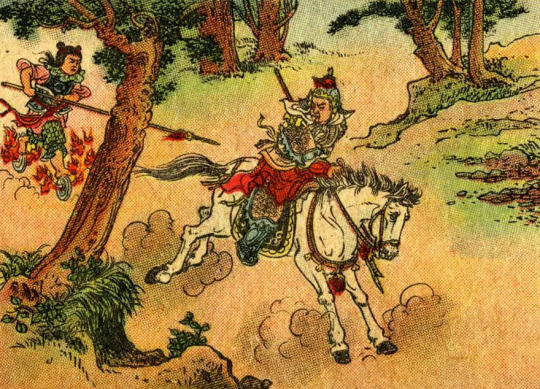
Luckily, Li Jing happened to run into his second son, Muzha. Following Muzha's defeat by Nezha's hands, Li Jing tried to commit suicide. Wenshu Guangfa Tianzun ( a disciple of Yuanshi Tianzun and one of the Three Great Immortals, holding the fifth position among the Twelve Golden Immortals.) saved Li Jing's life and containing Nezha. Nezha was then forced to submit to his father after being restrained by another superiorman by the name of Randeng Daoren (renowned as the Superiorman of Mount Condor, Intuition Cave.)


[In popular culture, Nezha's killing of Li Gen and Ao Bing is often seen as a result of Ao Guang demanding young boys and girls from Chentang Pass as sacrifices. When the Dragon Kings of the Four Seas threatened to flood Chentang Pass in retaliation, Nezha committed suicide to save his family and the people. That plot is only found in the 1979 Shanghai Animation Film Studio movie, Nezha Conquers the Dragon King, and not in the Fengshen Yanyi novel or Qing dynasty opera adaptations.]
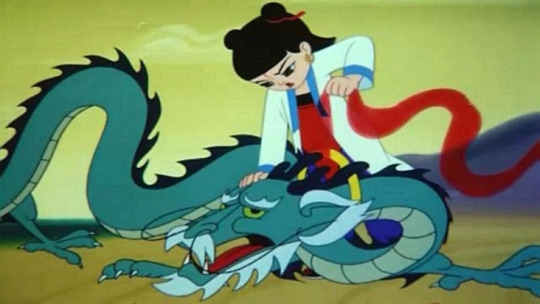

JTTW:
In Journey to the West, Nezha was a general under his father, "Pagoda-wielding Heavenly King" Li Jing. He fought the Monkey King, Sun Wukong, when the latter rebelled against the Jade Emperor.

They later became friends. Nezha made some appearances in the novel to help the four protagonists defeat powerful demons including his adoptive sister, Lady Earth Flow.

His origin story is different from the other legends. After he caused havoc in the Eastern Ocean, the Heavenly King had been so worried about the disastrous consequences that he decided to kill Nezha. Thus Nezha returned his flesh and blood to his mother and bones to his father. Then Nezha's soul went to the Buddha, who resurrected him. After, he used his vast powers to subdue 96 caves of demons through dharma. After this Nezha wanted to kill his father because he had to remove every piece of flesh and every stain of blood to return his bones to his father. The heavenly king had no choice but to seek help from the Buddha. The Buddha gave him an intricately made golden pagoda, in each story of which were Buddhas radiant with splendor. The Buddha told Nezha to regard these Buddhas as his father, thus ending the hatred between the father and the son and Li Jing earned the title of Pagoda-Bearing Heavenly King.
In the JTTW Li Jing and Nezha gain another family member Lady Earth Flow.
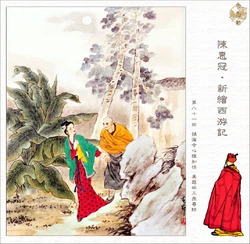

Lady Earth Flow (地涌夫人) is a yaoguai who is actually a Golden-Nosed Albino Rat Spirit (金鼻白毛��鼠精) who obtained her powers after practising Taoist arts for 300 years and secretly consuming sacred candles at Vulture Peak. After she was captured by Li Jing and Nezha, she was supposed to be executed but the Buddha told them to spare her life. She was so grateful that she acknowledged Li Jing as her godfather and Nezha as her godbrother. Later, she moved to the Bottomless Pit (無底洞) at Flaming Air Mountain (焰空山) and armed herself with a pair of swords. When the protagonists pass by Black Pines Forest (黑松林), she disguises herself as a damsel in distress to attract Tang Sanzang's attention. Tang Sanzang takes pity on her and lets her accompany them to a nearby temple, but Sun Wukong sees through her guise. She eats six monks in the temple and captures Tang Sanzang when Sun Wukong and the others are distracted. Sun Wukong finds out her true identity later and brings Li Jing and Nezha to subdue her and take her back
[According to The Journey to the West, Nezha was born with the word Ne written on the palm of his left hand and zha on his right, hence his name.]
[In Journey to the West, Muzha became a disciple of Guanyin in the heavenly court, with the legal name Hui An. When he was ordered to conquer the sand demon, and later Sun Wukong lost to the Red Boy, Hui An borrowed 36 Tian Gang swords from his father Li Jing to help the Guanyin Bodhisattva conquer the Red Boy, making him a good boy under the Guanyin.]
LMK:
Ji Ling:
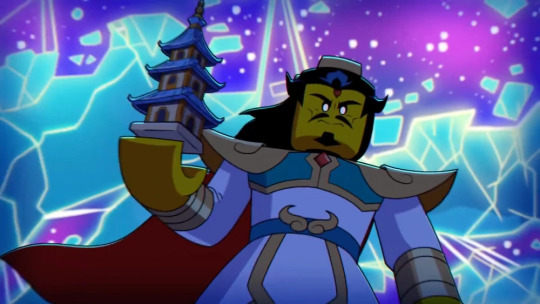
After the Brotherhood, Li Jing was assigned the responsibility of overseeing the Celestial Realm with the Jade Emperor gone. The universe was teetering on the brink of destruction due to the damage caused to the Pillar of Heaven by the Jade Emperor's demise.
Li Jing harbored concerns that Monkey King's actions could exacerbate the impending destruction of the universe.Monkey King challenged Li Jing, asserting that he couldn't be stopped, not even by the Celestial Pagoda. While Li Jing acknowledged the truth in Monkey King's claim, he swiftly subdued him by placing a circlet on his head. Ne Zha tried to intervene on their behalf, but Li Jing swiftly silenced him, putting an end to any further discussion.
After breaking out of prison, MK, Monkey King, and Macaque returned Megapolis where Li Jing caught up to them. Li Jing swiftly closed in on Monkey King, tightening the circlet around his head. Macaque intervened by teleporting both MK and Monkey King to safety inside the Team Power Truck. As they made their escape, Macaque was eventually overpowered by Li Jing, who imprisoned him in the Celestial Pagoda.
In Harbinger; Li Jing and Ne Zha met up with the Monkie Kids and Monkey King, where Li Jing believed that the Pillar of Heaven was now irreparable, leading them all to confront the reality of the universe's impending destruction as the Great Cycle approached its end. As Li Jing looked at Ne Zha, he felt a mix of pride and regret for not having more time to share with him.
When the World was saved; After some time, Li Jing saw Ne Zha leading the Celestial Warriors in the rebuilding of the Celestial Realm, and made him smile in approval.
Nezha:

Ne Zha is a heavenly deity from the Celestial Realm, serving as both a member of the Celestial Court and a guardian. A stern and responsible celestial. He is occasionally short-tempered, mostly in regards to the Monkey King, though is shown to be understanding and kind to MK. He is often seen being understandably exasperated and annoyed.
During the Monkey Kings attempt to reforge the Samadhi Fire to defeat Lady Bone Demon,Ne Zha tried to stop him too late due to Macaque's interference. Ne Zha discovered that Mei held one of the four fragments of the Samadhi Fire and teamed up with MK to prevent Monkey King from reaching Lady Bone Demon, but Monkey King was corrupted by her and defeated Ne Zha by encasing him in crystal. Ne Zha was eventually freed during the final battle with Lady Bone Demon and aided the Monkie Kids in destroying her.
Later, Red Son warned Ne Zha about the Brotherhood's plan to attack the Celestial Realm. Despite his best efforts, Ne Zha was overpowered and injured by the Brotherhood, seeking refuge on Flower Fruit Mountain with the Monkie Kids. After the final standoff with the Brotherhood, Ne Zha safeguarded the Power of the Jade Emperor in a seal and vowed to protect it.
During Season 5, he was a silent character till the end when he stopped his father from interfering with the Monkie Kids Crew.
Images :
Overley Sarcastic Productions.
https://www.viewofchina.com/nezha/
LMK Screen Shots
41 notes
·
View notes
Text
Me, staring at the "Nezha is eternally 12/Nezha is often depicted as a kid so he's just a kid and nothing else" crowd: man, have you heard of Child Manjushri a.k.a. Wenshu Tongzi
(This is totally not an excuse for me to find cool statue pictures and talk iconography)
So, here is Bodhisattva Manjushri in his standard "graceful aristocratic prince" form, riding his azure lion. The statue in the picture doesn't have it, but oftentimes, he'll also be holding a flaming sword that symbolizes wisdom's ability to cut through ignorance and delusions.
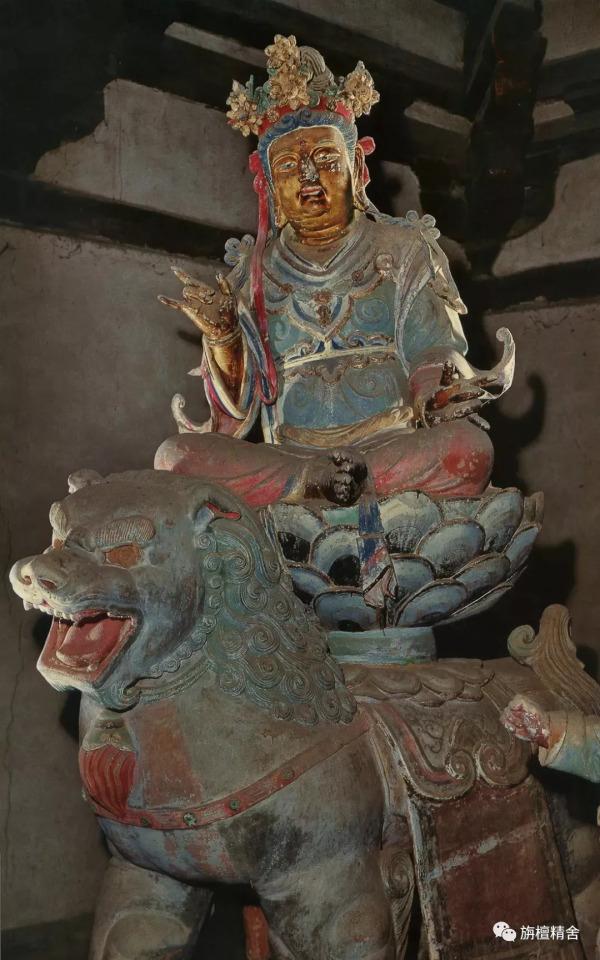
This is "Holy Old Monk Manjushri", a variant that I came across a few times while temple-touring, but couldn't find many good online pictures of. It seemed like a thing that was popular around Mt. Wutai, based on the "Buddha-palita met Old Man Manjushri" tale. Sometimes his BFF Samantabhadra is depicted as an old man too, for matching purposes.
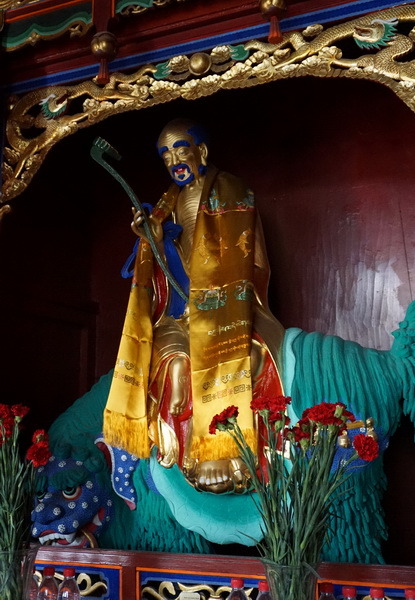
And this is Child Manjushri, with his five hair buns, often worshipped in an esoteric context. On Mt. Wutai, there are five major temples atop five peaks, each worshipping a different form of Manjushri, and the "middle peak" temple has a Child Manjushri in their main hall. Like, it's far from the most common variant, but neither is it this super obscure form that no longer enjoys active worship.
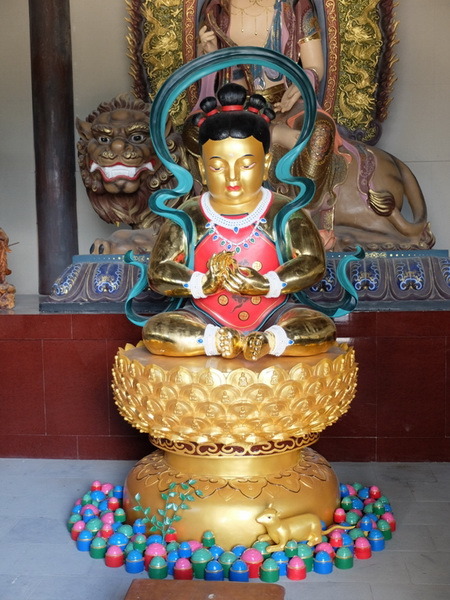
Lastly, just for fun: this is Yamantaka, a guardian deity/Wisdom King, who, in Tibetan Buddhism, is believed to be Manjushri's wrathful form.
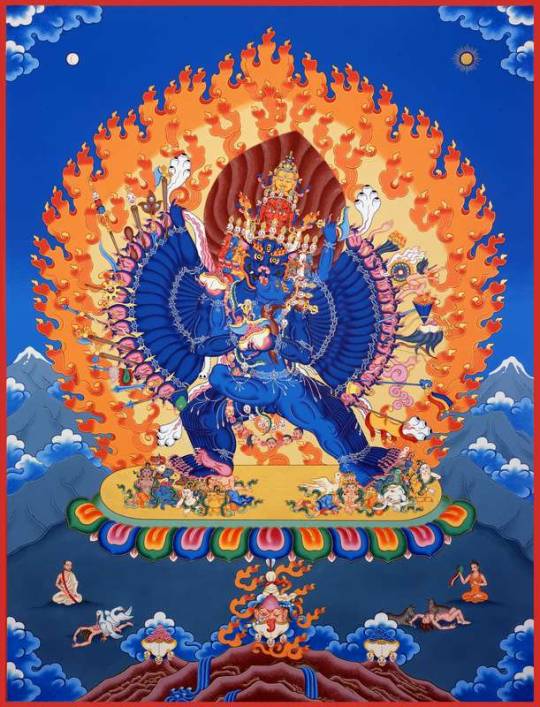
If you wouldn't call Manjushri "the eternal child Bodhisattva" just because he has a child form, why would you say Nezha is an eternal child when he, too, has both child and adult forms?
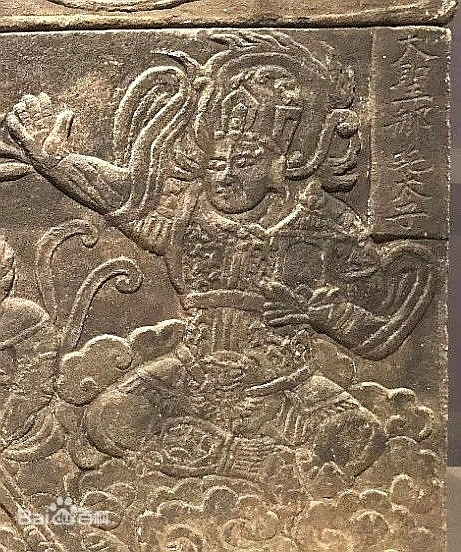
Even though Nezha's child form is vastly more popular and well-known than Child Manjushri, I think my point still stands: A deity is capable of having multiple manifestations, of varying ages and appearances, each fulfilling a particular function and niche——none of which is the "One True Form TM", just different clothes they wear based on occasions and audiences.
To stretch the analogy a little, Manjushri's child form is the formal dress he puts on before attending a religious event, while Nezha's child form is the lotus T-shirt he wears a lot while appearing on TV, to the point it becomes his most iconic attire.
This doesn't mean he only has a single shirt, for goodness sake, and using his child form as evidence for the "eternal child" claim is like saying Nezha's only allowed to wear that one shirt and nothing else.
#chinese mythology#chinese religion#buddhism#manjushri#bodhisattva#nezha#buddhist art#fandom discourse#lego monkie kid#...tagging lmk because where else would I see the “eternally 12” thing proliferate#this will be my only two cents on the topic#barring answering asks that are specifically about Nezha in FSYY/JTTW
145 notes
·
View notes
Text
PoV: You are Muzha

165 notes
·
View notes
Text
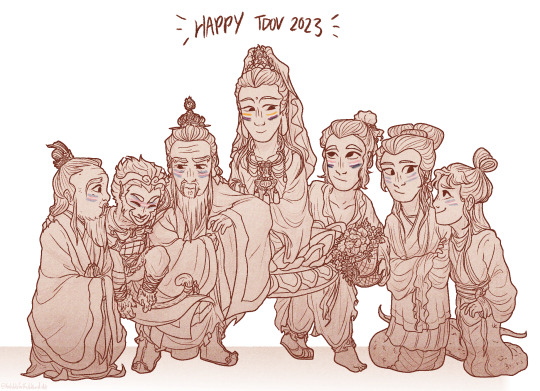
A little late but happy Trans Day of Visibility!!!
[ID: A monochrome chibi drawing of various figures from Chinese folklore with pride flags painted onto their faces. From left to right are Taibai Jinxing, Sun Wukong, Taishang Laojun, Guanshiyin Pusa, Lan Caihe, Bai Suzhen, and Qing She. Guanyin has nonbinary flags and Lan Caihe has genderfluid flags, but everyone else has trans flags. Above them is written "Happy TDOV 2023!" End ID]
#my art#tdov#tdov23#chinese mythology#journey to the west#jttw#xiyouji#sun wukong#monkey king#legend of the white snake#bai suzhen#qing she#xiao qing#wanna make it very clear that i am referring to folkloric deity taishang laojun not historical figure laozi. bc thatd be insane gfhdjkfdh#anyways no nezha this year bc i decided to go with only historic and/or reasonably textually supported characters ^-^#will add details in a reblog
480 notes
·
View notes